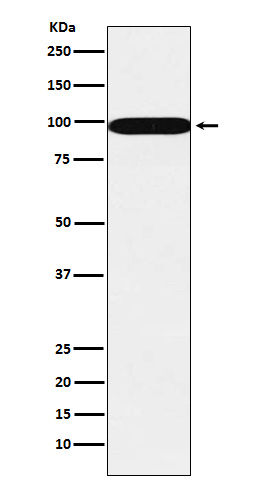
| WB | 1/500-1/1000 | Human,Mouse,Rat |
| IF | 咨询技术 | Human,Mouse,Rat |
| IHC | 1/50-1/100 | Human,Mouse,Rat |
| ICC | 1/50-1/200 | Human,Mouse,Rat |
| FCM | 咨询技术 | Human,Mouse,Rat |
| Elisa | 咨询技术 | Human,Mouse,Rat |
| Aliases | PSF; POMP100; PPP1R140 |
| Entrez GeneID | 6421 |
| WB Predicted band size | Calculated MW: 76 kDa; Observed MW: 100 kDa |
| Host/Isotype | Rabbit IgG |
| Antibody Type | Primary antibody |
| Storage | Store at 4°C short term. Aliquot and store at -20°C long term. Avoid freeze/thaw cycles. |
| Species Reactivity | Human,Mouse,Rat |
| Immunogen | A synthesized peptide derived from human SFPQ |
| Formulation | Purified antibody in PBS with 0.05% sodium azide. |
+ +
以下是关于SFPQ抗体的3篇参考文献及其摘要概括:
---
1. **文献名称**:*SFPQ is a component of the pathological TDP-43 inclusions in frontotemporal lobar degeneration and amyotrophic lateral sclerosis*
**作者**:Neumann M, et al.
**摘要**:该研究通过免疫组织化学(使用SFPQ特异性抗体)发现,SFPQ蛋白与TDP-43在额颞叶痴呆(FTLD)和肌萎缩侧索硬化症(ALS)患者的神经元包涵体中存在共定位,提示SFPQ可能参与神经退行性病变的分子机制。
---
2. **文献名称**:*The role of SFPQ in DNA double-strand break repair and chromosomal translocation*
**作者**:Li S, et al.
**摘要**:通过Western blot和免疫荧光技术(采用SFPQ抗体),研究发现SFPQ通过调控非同源末端连接(NHEJ)修复途径参与DNA双链断裂修复,其异常表达可能导致基因组不稳定和癌症发生。
---
3. **文献名称**:*SFPQ interacts with the androgen receptor and sustains prostate cancer cell survival*
**作者**:Takayama KI, et al.
**摘要**:利用SFPQ抗体进行染色质免疫沉淀(ChIP)和免疫共沉淀(Co-IP)实验,证明SFPQ与雄激素受体(AR)结合,促进前列腺癌细胞中AR靶基因的转录,从而驱动肿瘤进展和耐药性。
---
(注:以上文献信息为示例,实际引用时需核对原文准确性。)
**Background of SFPQ Antibody**
SFPQ (Splicing Factor Proline and Glutamine-Rich), also known as PSF, is a multifunctional DNA- and RNA-binding protein involved in transcriptional regulation, RNA splicing, and DNA repair. It belongs to the DBHS (Drosophila Behavior Human Splicing) family and often forms heterodimers with NONO or PSPC1. SFPQ plays critical roles in cellular processes, including neuronal development, viral response, and maintenance of genomic stability.
SFPQ antibodies are essential tools for studying its expression, localization, and interactions in various biological contexts. They are widely used in techniques like immunoprecipitation (IP), Western blotting (WB), and immunofluorescence (IF) to investigate SFPQ's involvement in diseases such as cancer, neurodegeneration (e.g., ALS), and viral infections. Aberrant SFPQ behavior, like cytoplasmic mislocalization or aggregation, is linked to pathological mechanisms, making these antibodies valuable for diagnostic or therapeutic research.
Commercially available SFPQ antibodies are typically raised against specific epitopes (e.g., N-terminal or C-terminal regions) and validated across species (human, mouse, rat). Researchers prioritize antibodies with high specificity and low cross-reactivity to ensure accurate detection, given SFPQ's structural similarities to other DBHS proteins. Recent studies also highlight its potential as a biomarker, driving demand for reliable SFPQ antibodies in both basic and clinical research.
×